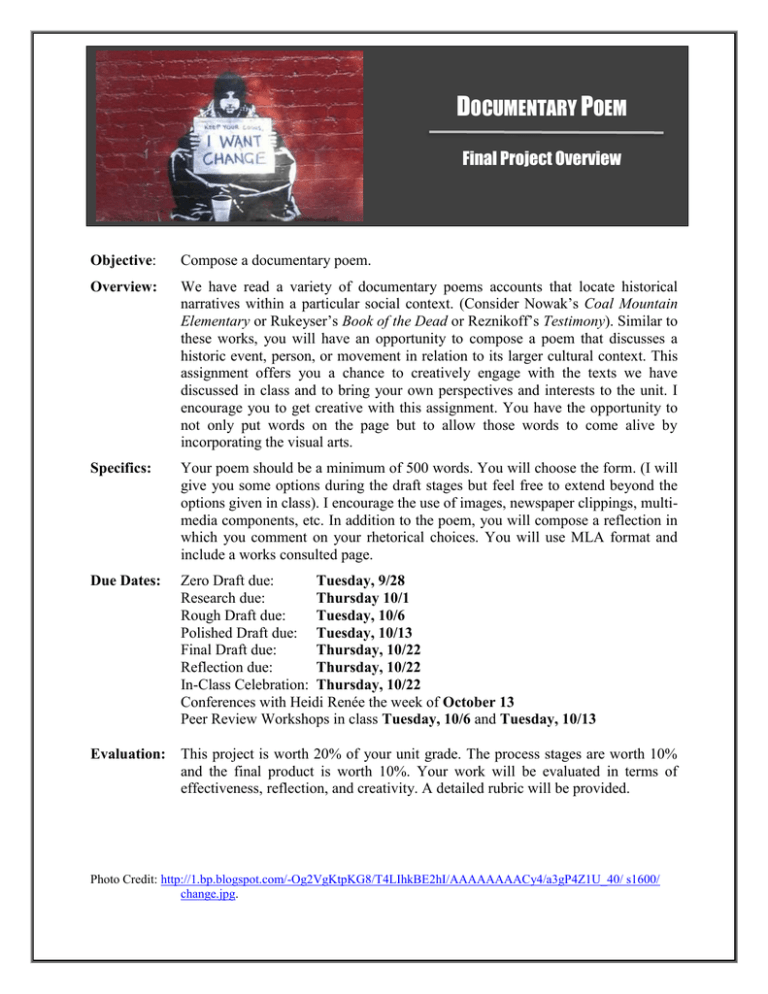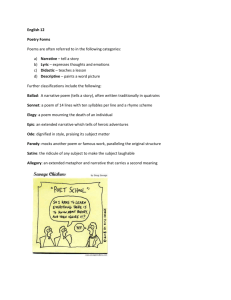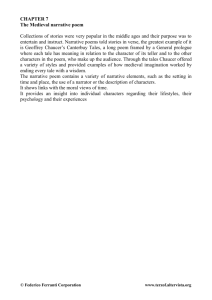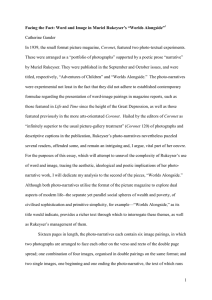Final Project Overview
advertisement

DOCUMENTARY POEM Final Project Overview Objective: Compose a documentary poem. Overview: We have read a variety of documentary poems accounts that locate historical narratives within a particular social context. (Consider Nowak’s Coal Mountain Elementary or Rukeyser’s Book of the Dead or Reznikoff’s Testimony). Similar to these works, you will have an opportunity to compose a poem that discusses a historic event, person, or movement in relation to its larger cultural context. This assignment offers you a chance to creatively engage with the texts we have discussed in class and to bring your own perspectives and interests to the unit. I encourage you to get creative with this assignment. You have the opportunity to not only put words on the page but to allow those words to come alive by incorporating the visual arts. Specifics: Your poem should be a minimum of 500 words. You will choose the form. (I will give you some options during the draft stages but feel free to extend beyond the options given in class). I encourage the use of images, newspaper clippings, multimedia components, etc. In addition to the poem, you will compose a reflection in which you comment on your rhetorical choices. You will use MLA format and include a works consulted page. Due Dates: Zero Draft due: Tuesday, 9/28 Research due: Thursday 10/1 Rough Draft due: Tuesday, 10/6 Polished Draft due: Tuesday, 10/13 Final Draft due: Thursday, 10/22 Reflection due: Thursday, 10/22 In-Class Celebration: Thursday, 10/22 Conferences with Heidi Renée the week of October 13 Peer Review Workshops in class Tuesday, 10/6 and Tuesday, 10/13 Evaluation: This project is worth 20% of your unit grade. The process stages are worth 10% and the final product is worth 10%. Your work will be evaluated in terms of effectiveness, reflection, and creativity. A detailed rubric will be provided. Photo Credit: http://1.bp.blogspot.com/-Og2VgKtpKG8/T4LIhkBE2hI/AAAAAAAACy4/a3gP4Z1U_40/ s1600/ change.jpg. Rhetorical Requirements… Be creative. Take risks. Make your narrative unique. Be passionate. An audience is easier to move when it believes you care. Passion is encouraged. Invite dialogue. Part of your task is to open a conversation. Your narrative should appeal to others and invite dialogue about the “so what,” or the larger implications. Use appeals. You consider appeals to logos, ethos, pathos, and mythos in order to influence and persuade your audience. Utilize tone. Your tone is appropriate to the content, rhetorical situation and audience. You use the elements of tone (imagery, syntax, diction, figurative language) to convey meaning and enhance the narrative. Have style. Your style (formal / informal) and organization (deductive / inductive) are appropriate for the narrative.





